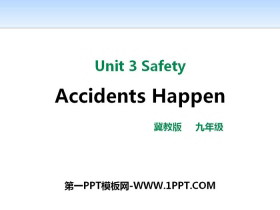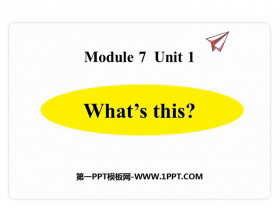

《What should we do before help arrives?》Help PPT课件
Answer the question
When something is broken, can you use it again?
No
What is a window made of?
glass
What do you call a table, chairs, cupboard, etc ?
furniture
In which room do we cook and eat foods?
The kitchen
... ... ...
Teaching aims
1.Key words :
broken, glass, medical, imagine, bottom,
at the bottom of…, wrong, What’s wrong with…?,
trouble, lift, lift up, drop, make sure
2. key structure:
But he could have trouble hearing you or speaking to you.
No, that could be harmful.
Betty, you must know!
3. Ability:
To listen and understand conversation about first aid.
To listen for specific information.
To talk about safety and first aid.
... ... ...
Words and expressions
/'brəʊkən/ 破碎的 adj. broken
/gla:s/ 玻璃 n. glass
/steəz/ 楼梯 n.(pl.) stairs
/eId/ 救助;帮助 n. once
first aid 急救
/'medIkl/ 医学的;医疗的 adj. medical
/I'mædʒIn/ 想象;设想v. imagine
... ... ...
1 work in pairs. Talk about the pictures.
Use the words in the box to help you.
accident broken dangerous
furniture glass kitchen stairs
Match the sentence with the picture:
It’s dangerous to run down the stairs
The piece of furniture is heavy and the boy cannot lift it.
There’s some broken glass in the kitchen.
2 Listen and check what the pictures are about?
Accident often happen before you notice them. You could fall when you go down the stairs at school. It’s quite dangerous in the kitchen
At home because broken glass or knives can cut you. And moving heavy furniture is dangerous too. You could drop it and hurt your foot.
Then work in pairs and describe the picture in more sentence.
... ... ...
Language points
1. He is in pain.他很疼。
in pain的意思是“处在疼痛之中”。如:
Are you still in pain?
你还疼吗?
2. But he could have trouble hearing you or speaking to you.但是他有可能无法听到你或者和你说话。
句中的could表示推测。如:
You could be right.
你可能是对的。
have trouble doing sth./have trouble with sth
的意思是“做…有困难”。
如:
We never have any trouble getting the car started.
发动这辆车子我们从没费过劲儿。
We’re having a lot of trouble with a new computer system
新的电脑系统让我们焦头烂额。
... ... ...
情态动词must, can, could表示推测
我们学习过情态动词can和could表示“能够”,表示对现在或将来的推测,意为“会,可能”,往往用于否定句和疑问句。用于疑问句时,can比could表示的“可能性”要大;用于否定句时,cannot (can’t) 表示“不可能”。如:
You can’t be serious!
你不是认真的吧!
could则可用于肯定句、否定句和疑问句。在以下例句中,can和could均表示可能:
He could be in pain.他可能很疼。
That could be harmful!那可能有害!
Can/Could this be true?这有可能是真的吗?
... ... ...
单项选择
1. Jenny ______ with him at that time, for I was having dinner with her in my home.
A. can’t have been B. mustn’t have been
C. must have been D. may have been
2. It is cold in the room. They ______ have turned off the heating.
A. must B. ought to C. should D. could
3. — Someone is knocking at the door.
— Who ______ it be at this hour of day?
A. may B. can C. must D. should
4. I didn’t hear the phone. I ______ asleep.
A. must be B. must have been
C. should be D. should have been
... ... ...
Fill in the blanks with the correct words or expressions in brackets.
It’s very dangerous. You _____(must/mustn’t) keep away from it!
They _____(could/mustn’t) still win – the game isn’t over yet.
__________(Move/Don’t move) the boy if he’s broken his arm.
______(Keep/Don’t keep) the boy warm. He’s freezing
关键词:《What should we do before help arrives?》教学课件,外研版八年级上册英语课件,八年级英语幻灯片课件下载,《What should we do before help arrives?》PPT课件下载,.ppt格式












